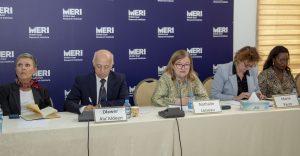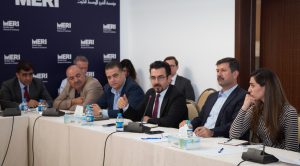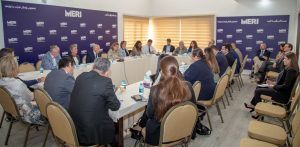A Policy Debate with European Parliament Subcommittee on Security and Defence
“The Middle East, Iraq and Kurdistan are key partners of Europe… What takes place here has consequences in Europe and vice versa”, said Nathalie Loiseau, Chair of the European Parliament Subcommittee on Security and Defence (SEDE) in a MERI policy debate held on 25 May 2022.
Ms Loiseau headed a delegation of seven members of European Parliament (MEPs), along with a group of senior parliamentary advisors and staff (listed below), who visited both Baghdad and Erbil. Their aim was to engage Iraqi policy- and decision-makers and to develop a deeper understanding of the security challenges facing both Iraq and the Kurdistan Region (KRI).
In her opening remarks, broadcast live, Ms Loiseau, stressed that the EU pays a special attention to the Middle East as its immediate neighborhood and works closely with its regional partners on security and defence issues. She appreciated the role of Peshmerga forces in the fight against Islamic State (IS) which she considered a threat not only to Iraq but to Europe as well. “We could defeat the IS caliphate because of the strength of partnerships and trust that exists between the EU and its partners”, she remarked.

Ms Loiseau believed that this strong partnership should continue in the future because the war against terrorism has not ended yet and IS should not rise again. However, relying only on military means will not be enough to achieve these goals. She pointed out that the EU has provided recovery and reconstruction programs to help internally displaced persons to return to their area of origins. Another important approach for the EU is to work with civil society organizations to fight terrorism and extremism in the region.
For the new challenges and ongoing conflicts in Iraq, Ms Loiseau explained: “the EU has to find better solutions and engagements in the region, and has to be modest and listen to local best practices to achieve better results”. She added: “Iraq plays an important role in encouraging peaceful relations with its neighbors, and we [the EU] have to play our part as well. We have to have a strong dialogue to develop a proper understanding.” She highlighted that the SEDE would like to ensure that the EU policies and actions are impactful on the ground. The Subcommittee usually proposes the budget for the EU security and defence programs and works closely with other EU institutions and the civil society to find better, more effective and durable solutions.
On the Peshmerga reforms and merging all of armed units into a disciplined and united force, Ms Loiseau commented that “unity among the different actors is vital”. Having unity, dialogue and mutual respect between the KRI and the EU are key to making the EU policies and actions in the Region more effective.

Discussion Under Chatham House Rules
Ms Loiseau’s presentation was followed by a highly engaging discussion which was carried out under Chatham House Rules. During this part, a number of issues were highlighted and discussed by various participants, these are summarised here without attribution or affiliation.
- IS has not been defeated completely. There is a security gap between the Peshmerga forces and the Iraqi Security Forces (ISF) in the disputed territories. IS has exploited this security gap and continues to pose a threat to the KRI and Iraq. On the other hand, the re-emergence of IS has helped many non-state armed groups to increase their hegemony in the Disputed Territories; thereby increasing tensions between these groups.
- The use of military means alone will not be adequate to defeat IS or eradicate terrorism. The current situation requires a strategic and comprehensive plan to prevent and counter extremist ideas within Iraq’s various communities. The root cause of terrorism and violent extremism must be tackled via tackling corruption, having an inclusive government, a fair distribution of wealth, strong civil society, effective security forces and justice system.
- The EU member states should take the responsibility on how to deal with the IS-affiliated families and imprisoned fighters who are coming from Europe. Hundreds of these are currently accommodated in Al-Hol and other camps in Rojava (Northeast Syria).
- Many Iraqi IDPs in camps, particularly Yezidis, have been forced to return back to their areas and cities of origin which have not been rebuilt yet. The EU member states can help the IS survivors and IDPs in Iraq by providing assistance for reconstruction and recovery.
- Unfortunately, there appears to be no political will from the Iraqi government to help the IDPs to return to their areas of origin and recover their normal way of life. It was recommended that the delegation from SEDE should discuss this issue both with the Iraqi and EU institutions, and support the Iraqi civil society organizations which are specialized in this area.
- The full implementation of the Iraqi Constitution and improvement in Erbil-Baghdad relations were considered priorities for Iraq’s state-building efforts. Tensions have been on-going for some time and should be addressed.
- Some attendees argued that the Peshmergas forces played a vital role in the fight against IS in Iraq, yet Baghdad has failed to provide salaries, capacity building or ammunition to Peshmarga from the outset. Meanwhile, the Iraqi Security Forces (ISF) do not represent all of the different communities in Iraq. The Kurds constitute less than 1% of the ISF. These issues must be addressed in the future.
- Since 2017, the KRG has started implementing a reform plan to unify all the Peshmerga forces under the Minister of Peshmerga. However, the process is facing challenges and barriers. The EU and its members states were encouraged to provide advisory and military support to Peshmerga forces not only in their fight against IS and terrorism but also in the reform process.
- Attendees argued that demographic changes have taken place in the areas which were liberated form IS. Many Christian and Yazidi families have failed to return to their areas of origin because they do not feel safe in the presence of inter-community conflicts and do not trust the Iraqi government’s ability to provide security. The Iraq government should work on regaining the trust of the people in the liberated areas by providing basic services and security to the local communities. Failing that, there is always a chance for conflicts to arise.
- The current situation in the liberated areas needs to be studied and the challenges better understood. The victims of the IS war have to be compensated by the Iraqi government via a comprehensive program.
- International support for the current IDPs living in Kurdistan Region of Iraq (KRI) has been declining over the years and is likely to end in the near future. Meanwhile, the Iraqi government has not communicated any plan or shown any will to solve the IDP issues. These have been one of the key drivers of onward migration to Europe. It was argued that it is in everyone’s interest to see the EU pressing Iraqis for solutions while continuing their support to the IDPs.
- The KRI, as a federal region, can be model for the wider Middle East, but it has its own problems when it comes to democracy, responsive government and institutionalisation. There are security challenges from its neighboring countries and internal conflicts inside KRI.
- The EU and the US were encouraged to engage Iraq more closely and have a positive role in stabilizing Iraq. The Iranian and Turkish security interventions inside Iraq were considered drivers of instability in the wider region as well as drivers of conflict inside Iraq.

Participants:
This roundtable was attended by a number of policy makers, civil society activists and academic experts as well as a delegation from the European Parliament Subcommittee on Security and Defence (SEDE) and the team of the EU Advisory Mission in Baghdad and in Erbil.
- Anna BARBIERI, Administrator at SEDE
- Anne MESKANEN, Head of EU Advisory Mission in Iraq
- Assita Kanko, MEP Belgium
- Arnaud Danjean, MEP, France
- Bakhtyar Mohammed, Ministry of Peshmarga, KRG
- Dlawer Ala’Aldeen, MERI
- Fuad Smail, MERI
- Gerrard Quille, Directorate General for External Policies at SEDE
- Hajar Omer Ismail, Ministry of Peshmerga, KRG
- Hemn Mirany, Ministry of Interior, KRG
- Kamaran Palani, MERI
- Karwan Gaznay, MP, KRI
- Khidir Domle, Civil society activist, Iraq
- Juozas Olekas, MEP, Lithuani
- Javier Nart, MEP, Spain
- Jwan Younis, MP, KRI
- Lars Patrick Berg, MEP, Germany
- Laylan Ibrahim Abdulla, Ministry of Peshmerga, KRG
- Marie Paret, Head of EU office in Erbil
- Martina Hesse, Political Advisor, SEDE
- Nabaz Salih Sedeeq, Ministry of Peshmarga, KRG
- Nathalie Loiseau, MEP, France
- Osman Laylani, Academic, Salahaddin University, Erbil
- Roman Pable, Political Advisor, SEDE
- Sana Salah Mohammed, Ministry of Peshmerga, KRG
- Simone karlstetter, EU Advisory Mission in Iraq
- Tanya Gili Khailany, Cofounder of SEED Foundation
- Talar Nuri, Civil society activist
- Urmas Paet, MEP, Estonia
- Wladimir Wilgenburg, Journalist

